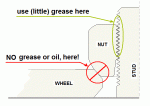Another Ahab
Well-known member
- 18,128
- 4,903
- 113
- Location
- Alexandria, VA
We all got opinions, but experience always speaks the loudest. The attached was pulled from another (separate) vehicle forum. Found other related threads that relate, but not addressing the issue specifically. Just curious. Any corporate memory or wisdom to share?
I disagree on the antisieze for lugs. I know someone that did out it on their freghtliner tractor, then when he went to take off the wheel later on, (after winter driving) he almost had to burn them off and replace the studs and lugs. We found out later that the anti sieze and either the road salt or calcium hyochloride they put on the roads reacted with each other. Basically it turned the antisieze into glue. My mechanic that does my inspections also does not put anti sieze on wheel studs cause he said he has had issues as well.
| A tip on the studs or bolts themselves is to clean them well before torqueing them together, and on lugs I highly recommend using ANTI-SIEZE compound (available at any auto parts supplier) to both lubricate the threads and guard against rust or corrosion later on. A/S Compound can be put on the threads and also on the rubbing surfaces of the hardware - such as the cone area of acorn type nuts. |
I disagree on the antisieze for lugs. I know someone that did out it on their freghtliner tractor, then when he went to take off the wheel later on, (after winter driving) he almost had to burn them off and replace the studs and lugs. We found out later that the anti sieze and either the road salt or calcium hyochloride they put on the roads reacted with each other. Basically it turned the antisieze into glue. My mechanic that does my inspections also does not put anti sieze on wheel studs cause he said he has had issues as well.
Last edited by a moderator:





